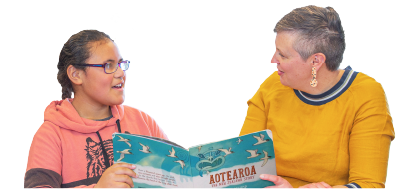Putting culture at the heart of school events
Show video transcript
Title slide: Putting culture at the heart of school events
Exterior of Kingsford School
Ioane Ioane, BOT Deputy Chairperson, Pastor, Parent, Kingsford Primary, Auckland, facing camera
Beginning of this year at Kingsford we've tried to build relationships, especially with our new staff, mostly from overseas. So one way that we have come up with is a Fiafia night, where we actually put on an island feast. So we had a massive pig come in, roll in – palusami – all the island food. And that’s the way we have tried to interact with our culture here and just bring it into our community as one at Kingsford. So that's one way we've done it.
Rebecca Wood, BOT Chairperson, Previous Parent, Kingsford Primary, Auckland, facing camera
The Kingsford environment is important to us as board members because it's important that our teachers are sensitive to our students’ requirements. We had a cultural night at the school last year and that was a great success as well as it brought the families all in. Prior to that there wasn't a lot happening, but it made such a difference. People tend... parents, family come into the school more than they used to before. There's an open-door policy here, which is really important. It's brought out families into our school. We didn't have a lot of that before. The parents used to just drop their kids off and disappear. We’d hold events and there wasn't much of a turnout. But now since the focus has been around cultural focus, the parents come in.
Shots of school environment
Kate Faavaivaiomanu Va’aelua, Christchurch
One of the approaches that really worked for me when I was at school was having a separate Pasifika night or open night. We called these “Pasifika evenings”.
Kate Faavaivaiomanu Va’aelua, Christchurch, facing camera
They usually have the wider school evening and then we always had a separate one for the Pasifika students. This helped give students a sense of belonging and just connecting each other with other cultures. Just, for me, it was good knowing that I wasn't the only one. Meeting my peers and “Wow, okay there’s a few of us, there's a lot of us actually”. And that gave me the confidence to just get into school, do my best.
Images of Ioane Ioane and family
When I think about it, often when schools hold the wider school events, a lot of Pasifika parents just send their children as they think it's just meant for them. It's their school thing.
Kate Faavaivaiomanu Va’aelua, Christchurch, facing camera
So I think holding Pasifika evenings or events that are specifically aimed for Pasifika families, I feel that it will give their parents and families a boost to come along with their children. That will also give them the confidence to come in and see what's actually happening in their kids' schools.
Rebecca Wood, BOT Chairperson, Previous Parent, Kingsford Primary, Auckland, facing camera
The key success in Kingswood School for our Pacific learners has been our cultural events, which have brought the families into the school. We have an open-door policy so those families can come in at any time. And it's our teachers being culturally sensitive to our students’ needs.
I think where the improvement can be in our area, in our school, is if different cultural leaders come in and assist with different things, which we have a lack of at the moment because we've got a lot of overseas students. I'm sorry, a lot of overseas teachers – where our cultural... they’re coming into New Zealand dealing with Pacific Island culture for the very first time. And I think that's where our community leaders need to step up.
This video is about knowing your students, the cultures they identify with, and what this means for them. Cultural celebrations are beneficial to learners’ progress. In this video, Board members at Kingsford School talk about the importance of having a Pacific cultural event. Kingsford school’s Fiafia Night helps engage overseas teachers, who are new to the school, and highlights the importance of Pacific Island culture in New Zealand for them. Cultural activities also engage Pacific parents and celebrate the language, culture, and identities of Pacific learners.
Reflections for individual teachers
As you watch this video, think about the ways you celebrate the diverse cultural backgrounds of your learners.
- How do you celebrate the cultural identities of your learners based on their own personal, cultural beliefs and experiences?
- How do you get to know your Pacific learners as individuals? Do you use conversation and classroom activities to enable them to share their cultures and perspectives? How are you using the cultural knowledge and experiences of your learners as an integral part of planning curriculum and pedagogy?
- How do you work with other teachers in your school to celebrate Pacific language and culture? How can you encourage Pacific learners to read, learn, and write about their own culture?
Reflections for staff or departments
Cultural responsiveness does not mean just learning about your Pacific learners. If you are a staff member or a member of department staff, think about how your school celebrates the diverse Pacific cultures of your learners.
- How does your school put culture at the heart of your school events? Share how your school celebrates Pacific language and culture for your learners, and their families and communities.
- How are you helping non-Pacific staff to develop an awareness of Pacific cultural practice and cultural understanding? Share how your teaching staff grow their understanding of Pacific identity, language and culture.
How are you challenging your staff to seek professional development not only from workshops or cultural training but also by participating in Pacific events and community activities?

